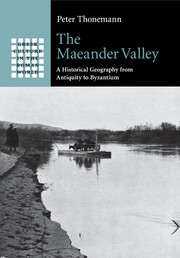Book contents
- Frontmatter
- Contents
- Maps and Figures
- Preface
- Acknowledgements
- Abbreviations
- Map 1 The Maeander valley
- 1 The valley
- 2 Hydrographic heroes
- 3 The nature of Roman Apamea
- 4 The fortress at Eumenea
- 5 The pastoral economy
- 6 The nobility of Mt Cadmus
- 7 The rural economy
- 8 The bounty of the Maeander
- Epilogue The historical geography of the Maeander valley
- Bibliography
- Index
8 - The bounty of the Maeander
Published online by Cambridge University Press: 07 October 2011
- Frontmatter
- Contents
- Maps and Figures
- Preface
- Acknowledgements
- Abbreviations
- Map 1 The Maeander valley
- 1 The valley
- 2 Hydrographic heroes
- 3 The nature of Roman Apamea
- 4 The fortress at Eumenea
- 5 The pastoral economy
- 6 The nobility of Mt Cadmus
- 7 The rural economy
- 8 The bounty of the Maeander
- Epilogue The historical geography of the Maeander valley
- Bibliography
- Index
Summary
C’est la mer qui faisait vivre ces villes; c'est le fleuve qui les a fait périr.
The plain of the Maeander
‘Concerning the alluvium from the rivers of India,’ Strabo reports, ‘Nearchus gives the following parallels: that the Hermos plain and the Cayster plain, and those of the Maeander and Caïcus, are similarly named because they are all increased, or rather created, by the rich and soft silt which is carried down from the mountains into the plains. It is the rivers that carry it down, so that the plains are as it were their offspring, and it is right that the plains should be named after them, and said to be “theirs”.’ The geographical expression ‘the plain of the Maeander’, often used by ancient authors to refer to the lower Maeander valley, and above all to the Maeander delta, is more eloquent than it might at first appear. The phrase does not simply refer to the plain which happens to have the Maeander river flowing through it, but specifically designates the area understood in antiquity to have been created by the Maeander river. This, I suggest, expresses a certain way of conceptualising the region. As Egypt was, for Herodotus, the ‘gift of the Nile’, so the territories of Priene, Magnesia and Miletus, were all the gift of the Maeander. It was the advance of the Maeander delta, uniquely swift and catastrophic as it was, that led Pausanias to his famous hypothesis concerning the causes of alluvial deposition (that the rapidity of deltaic progradation in the first millennium bc was the result of anthropogenic process further upstream). It is no coincidence that it is here in the delta that we find the only attested cult of the Maeander river, at the small town of Thebes on Mycale, overlooking the plain visibly spreading outwards into the waters of the Aegean sea.
In this final chapter, I shall explore the effects of this process on the communities of the Maeander delta. The focus throughout will be on economic realities; but it was by these realities that the social and religious mentalities of the inhabitants of the Maeander delta were shaped, and I shall from time to time try to make this relationship explicit. I begin with the practical consequences of the constant creation of new land, and the means by which the legal and economic problems arising from this were resolved. From this I turn to the exploitation of the delta environment through the characteristic industries of the Maeander wetlands, with an attempt to assess their significance for the micro-regional economy.
- Type
- Chapter
- Information
- The Maeander ValleyA Historical Geography from Antiquity to Byzantium, pp. 295 - 338Publisher: Cambridge University PressPrint publication year: 2011



